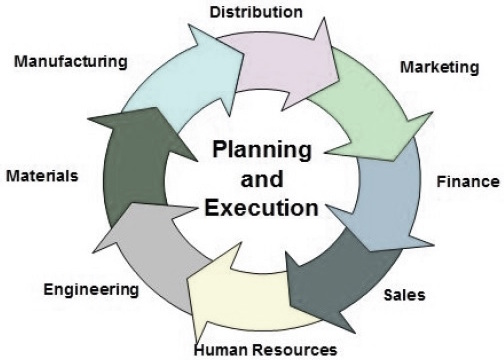ADDRESS
Khurrampur, Farrukh Nagar, Haily Mandi Road, Gurgaon, Delhi (NCR)
SAP ERP
Enterprise Resource Planning (ERP) is a software that is built to organizations belonging to different industrial sectors, regardless of their size and strength.
The ERP package is designed to support and integrate almost every functional area of a business process such as procurement of goods and services, sale and distribution, finance, accountings, human resource, manufacturing, production planning, logistics & warehouse management.
ERP is a business management software is usually a suite of integrated applications that a company can use to collect, store, manage, and interpret data from many functional areas including

Every business, regardless of the industry they belong to, require connected systems with efficient information flow from one business process to another. Business Process Integration (BPI) plays an important role in overcoming integrating challenges that allows organizations to connect systems internally and externally.
Business Process Integration (BPI) allows −
An ERP system typically performs the following functions −
Supports the integrated business process inside the organization.
Improves capital planning and helps in executing organizational plans and strategies.
Helps speed up the decision-making process over the analysis of accurate data.
Helps extend the business network to wider domains, expanding the products and services to reach more customers, suppliers, and partners.
Identifies operational risks to improve governance.
Provides protection against organizational data breaches and security threats to leakage of information.
Makes the organization adaptable to the rapid changes in the business process according to the needs.
Gives long-term profit by providing means to increase the customer base.
ERP is a business management software is usually a suite of integrated applications that a company can use to collect, store, manage, and interpret data from many functional areas including −
Financial Accounting − Deals with financial transactions and data.
Human Resource − Deals with information related to employee of an organization.
Customer Relationship Management − Deals with capturing and managing customer’s relationship, facilitating the use of customer experience to evaluate the knowledge database.
Sales and Distribution − Deals with order placement, delivery, shipment and invoicing.
Logistics and Warehouse Management − Deals with storage of products and shipment.
Manufacturing and Material Management − Deals with the production and production planning activities.
Supply Change Management − Deals with the movement of products, storing, managing, and controlling supplies.
Business Intelligence − Analyzes data and converts the same to information.
By integrating the business processes, the ERP offers the following advantages −
Saves time and expenses.
Allows faster decision-making by the management, utilizing the data and reporting tools designed in the systems.
Single data source and sharing of data among all the units of an organization.
Helps in tracking every transaction that takes place in an organization, from starting till end.
Supplies real-time information whenever required.
Provides synchronized information transfer in between different functional areas such as sales, marketing, finance, manufacturing, human resource, logistics, etc.
Date : 07 Oct, 2023